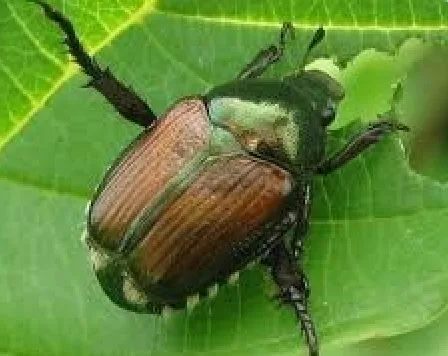
PASCO, WA – Annual Japanese beetle (Popillia japonica) treatments began today in south-central Washington State. The Washington State Department of Agriculture is conducting Japanese beetle treatments in Grandview, Sunnyside, Mabton, Prosser, Wapato, and Pasco as part of a multi-year eradication effort.
Treatments on large public properties begin early this week, and crews will follow with treatments at private residences where residents and property owners have given consent. Property owners who have land in the treatment area are encouraged to provide consent as soon as possible. For those who have their PIN, consent can be given at agr.wa.gov/beetles. For additional assistance in giving consent, property owners can contact the Pest Program at pest@agr.wa.gov or 1-800-443-6684. Assistance is available in both English and Spanish.
WSDA hopes to treat 11,000 properties in southeastern Washington. A certified pesticide applicator contractor will conduct the treatments on behalf of WSDA. The product being used for the treatments—an insecticide called Acelepryn—is a reduced-risk pesticide that poses low risk to humans, pets, and birds, according to the Washington State Department of Health.
Preparing property for treatment
Notices will be sent to residents before treatments occur. Even for those who have consented to have their property treated, there are steps they need to take to enable WSDA to treat their yard:
- Clear lawn of all items.
- Keep pets inside or isolated from lawns and shrubs.
- Keep gates unlocked or open as backyards also need to be treated.
- Ideally, mow the lawn shortly before treatment.
Once the property is treated, both people and pets should stay out of treated areas until the product is dry. Once it is dry, entrance is permitted without any further restriction.
Background
Japanese beetles were initially detected in Grandview and Sunnyside in 2021 when a total of three beetles were trapped in the area. The following year, WSDA trapped over 24,000 beetles in the same area. Numbers dropped to 19,000 beetles in 2023.
“Our efforts are starting to work,” Camilo Acosta, Japanese beetle eradication coordinator, said. “But the people who sign up for treatments, the more successful we’ll be at getting rid of this pest.”
Japanese beetle adults are metallic green and brown and have little tufts of white hair on their sides. They emerge – usually from lawns or in other soil – in the spring and feed throughout the summer. From fall to spring the grubs (larvae) overwinter in the soil and slowly develop into mature adults ready to emerge again in the spring.
The beetles are a pest of more than 300 types of crops, including lawns, roses, grapes, hops and more.

